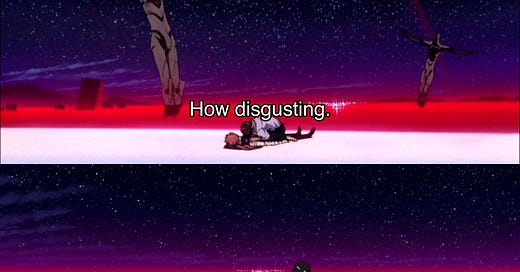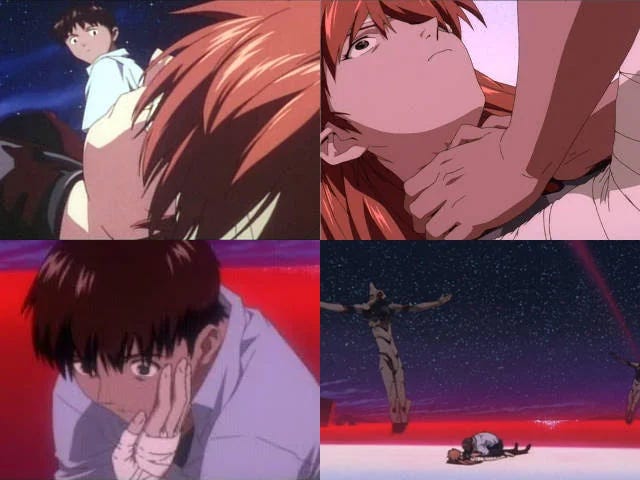*Spoilers for La La Land, Past Lives, and Evangelion ahead
I got into a discussion with a friend in regard to our favorite romance movies; we couldn’t come to an agreement on what kind of endings were our favorite. Bright bubblegum sweetness paid out in a “love always wins” finale or melancholic devastation akin to a horror movie disaster. I, historically, have preferred the latter.
Immediately, “La La Land” comes to mind. The quintessential pop culture example of a bittersweet ending structure, the film concludes after a time skip reveals the main characters have become estranged and do not romantically end up together. By including the details about the duo achieving their respective career milestones by surrendering their star-crossed relationship, there’s a sweet varnish on an otherwise bitter resolution.
Sometimes, even that’s not the case, though. In the more recent “Past Lives”, there’s such no respite.
After the main female lead, Nora, lead rediscovers feelings of affection toward her first love, Hae Sung, she’s left to make the decision of returning his feelings. But with her husband and the life she’s built up on her own, she can’t bear to abandon what she has. The gravitational pull of pragmatism holds true.
If just a few variables were different, it may have worked out; but they weren’t, and the sole lingering consolation is: not in this lifetime… but perhaps in another. Some of the final dialogue goes as such:
Hae Sung: “What if, this is a past life, and in some next life, we’re something more to each other?”
…
Nora: ”I don’t know.”
Hae Sung: ”Me neither… I’ll see you then.”
It’s heart-wrenching, coming to terms with what isn’t meant to be. But beyond being impactful, it’s very human. Within my brief history of human relationships, the catharsis of a positive conclusion is a rare occurrence. Most are in ongoing flux, but in terms of conclusions, it’s far more common where relationships crumble for any reason from a seemingly infinite number of pitfalls.
When the feeling of loss and failure are too much, we’ll need to find some sort of reasoning to be able to move forward. Even if it’s “not in this lifetime”.
The kids call it “copium” and I find it to be a constant state of living. For example, it’s not often where I catch myself glowing from a huge relationship win.
In other words, I adore bittersweet endings for their ability to be a medium of commiseration. They acknowledge a common experience that’s, in my opinion, seldom discussed.
If I were to find solace only in poignant endings, I’d classify myself a masochist, or I’d self-diagnose myself with depression. I’d still say I’m a romantic and enjoy feel-good endings, with a caveat; they need to feel hard-earned.
The strongest example I have of this is Evangelion as a whole series, albeit it’s not what I’d classify as a romance story. The first episode of the series aired in 1995. The final remake movie released in 2021.
The official ending for the series that kicked off in the 90s was named “The End of Evangelion” (EoE). The story as a whole is too complex for me to summarize here, but TL;DR the main protagonist, Shinji, struggles with self-doubt, depression, and loneliness throughout the series. In “The EoE”, he still has yet to overcome these inner conflicts, and experiences the death of his friends as a result. In the final scenes of the film, (loosely) he is able to save the world, on the reasoning of: suffering is part of the human experience. He almost kills his friend immediately after saving them. Pretty bleak.
The creator, Hideaki Anno, wasn’t satisfied with leaving it to end there. The first remake movie of the four, released in 2009, over 10 years after EoE, under the name: “Evangelion: 1.0 You Are (Not) Alone”.
Here’s an excerpt from the booklet insert from the DVD release:
We... what are we trying to make once again?
The visual opera "Evangelion" has been realized following many desires.
The desire to portray my sincere feelings on film.
…
”Eva" is a story that repeats.
It is a story where the main character witnesses many horrors with his own eyes, but still tries to stand up again.
It is a story of will; a story of moving forward, if only just a little.
It is a story of fear, where someone who must face indefinite solitude fears reaching out to others, but still wants to try.
We hope that you look forward to the 4 new retellings of this story.
…
September 28th 2006, a sunny day in Kamakura.
Creator/General Director, Anno Hideaki
Sparing all the details, the reprised canon conclusion is one where Shinji is able to grow up, find peace, and reach a sense of normalcy. And it’s so fucking sweet. The viewer has grown up alongside the creator, who had spent the better part of their life on telling this story, struggling with these ideas. Ultimately, watching an ending representing self-forgiveness and self-love, after being left with a brutal ending of EoE for two decades, feels hard-earned.
A cosmically unlikely victory seems to be the only way I could put it. In those rare moments where love wins out, it’s so fucking gratifying. But we have to continue to hope and endure, using any reason we can justify to make the wait a little more bearable. And bittersweet endings sit there with you during the wait.
I guess you could call me an elitist romantic of sorts.
your local hater,
- chib






It's too bad Shinji just pisses me off
What are we in Nora, some type of Past Life?
Man Shinji is just like me FOR REAL! Was Hideaki Anno telling Shinji's story, or was he telling my story?